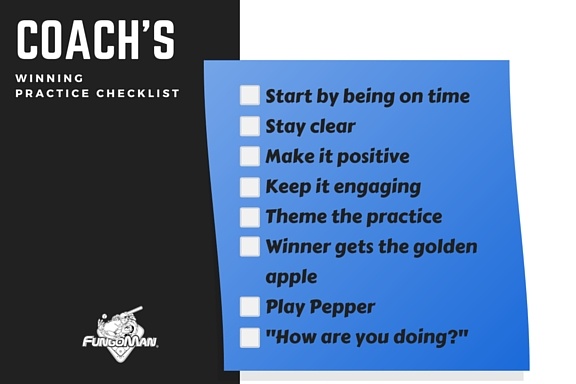
It's one thing to put together a stellar team, but it's another thing to get each player well-sharpened and ready for the season -- which is where nailing your practice comes into play.
All the little details that go into practice separate the exceptional teams from the mediocre. And great coaches know this and capitalize on those little details to take their team to the next level.
Check out some of those little details that we know will improve any baseball practice. Most likely you already put most of these good practices into your program (and good on you!), but you may be inspired to try out one or two for the team.
Small Changes That Will Dramatically Take Any Baseball Practice To the Next Level
1.) Start by being on time.
Putting an emphasis on punctuality adds a level of expectation for your players.
John Wooden says, "Failing to prepare is preparing to fail." If you give your players the opportunity to show up at a delegated time, it gives each player a chance to respect themselves enough to be at a place they said they would be.
Being on time literally improves a player's discipline and self-worth, as a responsible young person. Setting a start time empowers players to respect practice as a marked out time to come ready to work.
The Art of Manliness has a fantastic piece on the significance of being on time that's worth sharing: The Importance of Manly Punctuality.
2.) Stay clear.
If the expectations of practice are clearly laid out, players can be expected to arrive and deliver. Going over the practice schedule and requirements of gear are obvious details to communicate with your team, but going over each drill before executing keeps your players accountable to excellence all the way through practice.
And your words aren't the only things communicated to your players. In fact, most of what your players pick up are the ways you say what you say, and how you do what you do.
Sport Psychology for Coaches by Damon Burton and Thomas Raedeke does a great job of addressing the importance of your non-verbal communication in this excerpt:
As a coach, you can say a lot without uttering a word: A frown, a look of disbelief, a disgusted shake of your head, or a smile can communicate quite a bit. In fact, communication experts suggest that between 65% and 93% of the meaning of a message is conveyed through tone of voice and nonverbal behaviors (Johnson 2003). Thus, in addition to becoming aware of the words you use, it is essential that you become aware of your tone and nonverbal behaviors so that you understand the messages you are sending to athletes. (more here)
3.) Make it positive.
A positive reinforcement is more powerful than a negative one. Encouraging exemplary character and excellence both on the field and off will go a long way, but did you know that you can seriously shift your player's psychology in the face of adversity if you can teach him how to think in that moment?
Check out Shawn Achor's Positive Psychology studies on just how impactful your positive coaching can have on your practices and players.
The happy secret to better work.
4.) Keep it engaging.
No down time to stand around! Moving at a pace that keeps everybody on their toes is so important. Reasonably timing drills is a must.
Here are some great ways to move practice at a challenging speed:
- Have Drills Within Each Drill
- This rule of thumb is especially true for batting practice. It IS POSSIBLE to keep everyone engaged while the hitter is getting his work in.
- Base running drills during BP gives your players the chance to work leads and breaks from various bases.
- Check out more ideas for drills that will keep them on their toes: 5 Baseball Drills That Will Take You From Good to Great
5.) Theme the practice.
Incorporate a theme for everyone to be thinking about during practice. Giving a food for thought or an overarching game approach is great for engaging the learning mind.
Examples:
- "Today we're going to practice encouraging teammates while they work in every drill"
- Engage the mechanism: disciplining your focus (play loud music to simulate game distractions)
- Every play is the last out of the game: mentally preparing yourself for make or break game moments
6.) Winner gets the golden apple.
Make drills into games! Nothing will motivate your players more than some healthy competition. Keeping score adds a level of focus to your drills and urgency to make the play. Here are a few ideas on the house:
- Beat the buzzer: make the out in less than 4.2 sec at first
- Hitting for accuracy: setting up cones to help focus on hitting to the opposite field
- Bunt for the target: aim small, miss small
- Hit and run: set up trash cans to hit on right side of 2nd base
- The Golden Apple: Incentivizing practice is always great! Whether its a hard, cold, juicy Golden Washington State apple on a hot day or bragging rights, give your players some short-term rewards to play for in addition to the long-run goals.
7.) Play Pepper.
This drill is all about throwing, catching, and hitting. It's a three for one drill that requires all of your motor skills to work in full gear.
One player has a bat, the other has a glove. At 20 feet a part, the hitter is far enough away from the fielder so that he doesn't have to chase the ball, but rather field it with a certain amount of ease.
When practice hits a lull, this is a great drill for all parties involved (And it can be for more than one player).
8.) How are you doing?
Intentionally ask each player "how are you doing?" during practice. And really listen to their response.
You'll learn more about your team by hearing how each of your players is doing on that day. It will make it a lot easier when it comes time to make a pitching change or substitute a player for another. Your practice sessions are greatly enriched by communicating that you care.
After all, like Theodore Roosevelt said, "People don't care how much you know until they know how much you care."

(Check out this Infographic for baseball situation drills that will keep your team sharp and ready: 7 Communication Plays That Win or Lose Games [Infographic] )
I hope this has been a helpful checklist on the little details that make the difference for your team practices. Share with a great coach you know! We would love to hear your coaching tips in the comments section as well!

![Abandoning the One-Size-Fits-All Approach [Coaches Forum Footnotes] Abandoning the One-Size-Fits-All Approach [Coaches Forum Footnotes]](https://info.fungoman.com/hs-fs/hubfs/Abandoning%20One-Size-Fits-All%20Approach%20with%20Don%20Wakamatsu.png?width=324&height=160&name=Abandoning%20One-Size-Fits-All%20Approach%20with%20Don%20Wakamatsu.png)


Leave a Comment